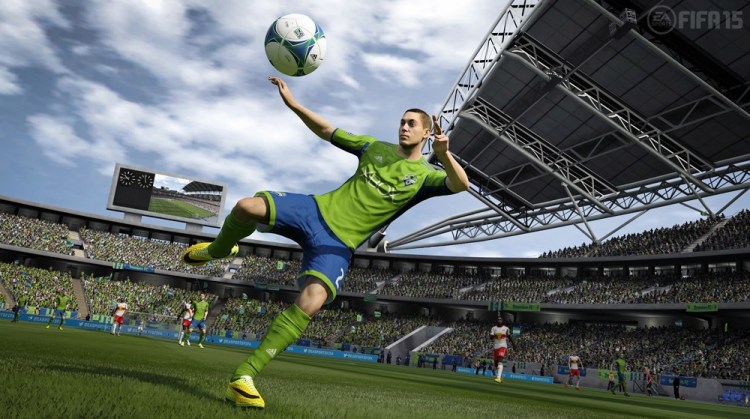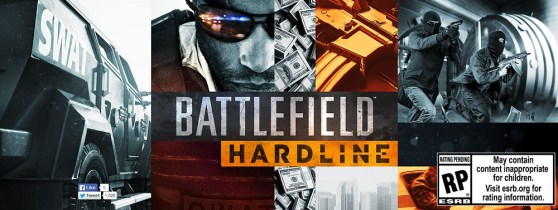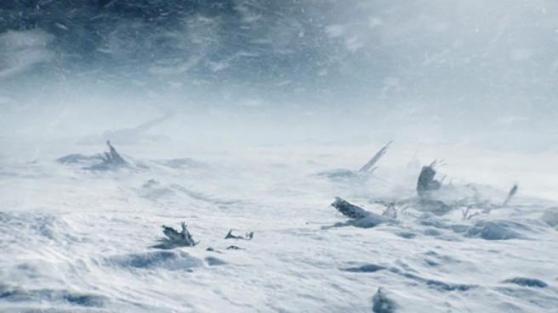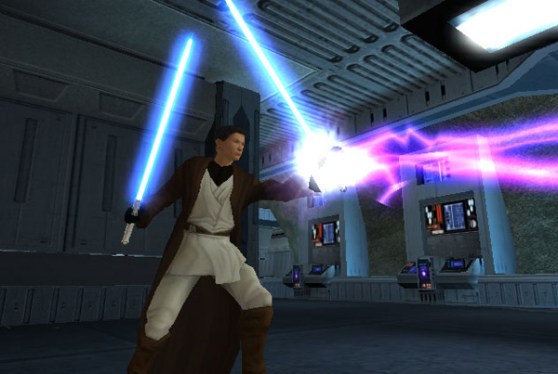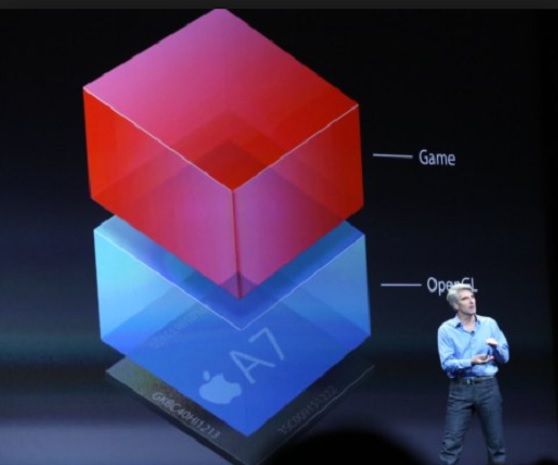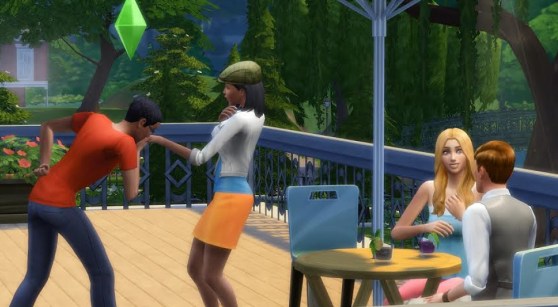We stopped by Electronic Arts headquarters in Redwood City, Calif., for a visit with Peter Moore, the chief operating officer of the giant video game company. Moore was getting ready for the Electronic Entertainment Expo (E3) and was about to call John Madden to tell him who the Madden NFL cover athlete would be (the winner is Seattle Seahawks standout cornerback Richard Sherman). But he found time to talk to me about how EA is trying to find its center with video game fans again.
The company was voted the “worst company in America” twice, but it escaped that fate this year under new chief executive Andrew Wilson. EA is regularly consulting players, and it is listening to its community of 330 million monthly active players. It consulted with them on its new Battlefield Hardline game, which is being unveiled at this week’s E3 show.
In our wide-ranging interview, Moore talked about why EA isn’t supporting the Wii U, the challenges of next-generation development, new games like Star Wars: Battlefront and Mirror’s Edge, and the new game empires of Apple, Google, and Amazon. Here’s an edited transcript of our interview.
GamesBeat: What’s on your plate for E3?
Peter Moore: It’s a little easier. This time last year we didn’t have a CEO. We obviously do now. That allows me to step back and do more real work, rather than being the face of the company and leading the press conferences. A lot more time to spend with the media and with analysts and investors. We’re a company that continues to keep Wall Street both interested and happy. We do a lot of analyst work and a lot of investor work at E3. I work with Blake Jorgenson, our CFO, and our IR department. That’s 100 percent of my time. I rarely get to see a retailer, which I’ll try to do as well.
As it currently stands, you won’t even see me on stage. I’ll be sat down with you somewhere. Andrew will lead that.
GamesBeat: There’s a move to get back the players, I guess?
Moore: I don’t know about “get back,” but continue to listen and take input from players at a higher level. We’ve always done that, but I think the tools and the desire from the player community is stronger than ever. Our ability to listen and implement feedback, in particular on some of our longer lead time games that are two or three years in development, has never been more front and center for us as far as what we need to do.
We did it with Battlefield Hardline. We have a group called the Game Changers, who are linked to just about every franchise in the company. These are core gamers who understand the genre, who are articulate, who can give feedback, who have played either that particular franchise or the genre as a whole for many years.
We can get good, meaningful, actionable feedback in a timely way. Usually around alpha. As you get to beta, it’s more difficult. You get feature complete. But if you can get them in early on a playable version of the game, listen to them playing, get some feedback from them, we’re doing that. We’re doing that all across the company. It’s a great bunch. In the last couple of years, we’re getting them in earlier and giving them playable builds. Typically they have to come on campus to do that. And we listen to them and talk to them afterward. There’s a greater focus on what we call “player first.”
GamesBeat: Does that lead to some things like, say, more interest in building communities around games, like Riot or Valve does?
Moore: We always have. 330 million played some form of an EA experience last month. We have community. It’s how you manage it, how you listen to them. We have, in Sandy’s broader group, community managers all around the world whose job it is to help gamers, listen to them, provide feedback, and get the jewels of information from these guys and bring it to the game teams.
They act as liaisons between the community. They listen to the complaints as well as the plaudits. They watch what goes on in the forums, because the community is also fragmented into individual forums. You can go into the depths of Reddit or NeoGAF and there’s intelligent conversations there somewhere. I know they’re there. That’s where you get to the core. If you spend a lot of time reading, you have to sift through some of the vitriol, but that’s where the core lives.
Community management is something we’ve always done here. The tools and the amount of people now, the top of the funnel, is greater than ever.
GamesBeat: What’s the key there in engaging with the community and then also just making sure you stay off the worst-company-in-America list?
Moore: You follow me on Twitter. I’ll try to talk to people who want to talk, rather than just shout. I ask them, “If this is a rant, fine. If it’s something I can help you with, I’ll do that.” A lot of people do that. There is carte blanche in this company, as long as you use common sense, whether it’s through Twitter or Facebook or even Instagram now—people post photographs of glitches. We jump in and try and help that way.
The idea ultimately becomes, we’ve been listening. We need to communicate the fact that we’re listening. We’re a big company. Over 8,000 employees. 70-odd locations around the world. Franchises that are being built on just about every continent. We have to tie all that back together again and get back to the roots of what built this company, which is focusing on the gamer.
That’s a mantra around here. It always has been, but it’s got lost in some of the other drama of the titles you just alluded to, which I think becomes a bit of a runaway train with gamers. People can pile on, and sometimes rightly so, but sometimes unfairly so.
 GamesBeat: Under Andrew Wilson, EA’s new CEO, have you had more leeway to pay attention to some of these things?
GamesBeat: Under Andrew Wilson, EA’s new CEO, have you had more leeway to pay attention to some of these things?
Moore: Even during the tenure when John left and we had Larry here, Larry was very focused on—he’d been here for a quarter century. He built this company. Some of the things he was reading and some of the things we did—the ability for us to be able to prove who we were again was very important to him. Andrew has continued that.
Andrew’s roots differ from John’s and Larry’s, coming from the development community within FIFA. Things hit harder to home for him, what you’re accused of and what you really do. He worked in Vancouver and worked on FIFA and built it from the 2006-2007 year, when we were neck and neck with Pro Evo. It’s very important to Andrew.
GamesBeat: I noticed a lot of games coming up to this point have all slipped into 2015 across the whole industry. It seems like maybe next-gen is still pretty hard.
Moore: We take great pride in—we were working on next-gen a couple of years out. We made sure we got our dev kits. Sony and Microsoft in particular were great at getting our core teams what they needed, and then we had a very strong focus for being ready around launch. Hardware-led software is not a good combination.
But at the same time, some franchises needed a bit more room, Need for Speed being one. While we got a very good Need for Speed out around launch, we decided to push back and not have one in FY2015. Probably you’ll see it again in FY2016. Just giving that team, Ghost Studios in Sweden, more breathing room to put some extra polish on the game. They have great ideas for breathing some fresh life into the game in some innovative ways. It wasn’t going to happen in 12 months.
Contrary to popular belief, we don’t push out games that aren’t ready. That might be the subject of laughter, but we don’t. We’re constantly looking at games and trying to figure out—The team will tell us when we think they’re ready. We try to factor a ship date. My team’s job is to build demand generation. As the guy responsible for all sales and marketing here, I’m figuring out when the right time is. But we absolutely do not force march a development to hit a ship date.
There have been numerous occasions, which you will never know of, where games have been scheduled to ship one day and then have been pushed out. Because we never announce the original date, you never know they’ve slipped. But a number of games, some of which are due in the next year or so, that were schedule originally to be earlier. We looked at them and said that they need more time.
GamesBeat: Battlefield: Hardline — is that for this year?
Moore: Oct. 21.
GamesBeat: That seems to be a challenge, trying to push that out, but you also had a Battlefield release last year.
Moore: Different studio. Hardline is built right there, literally 100 feet away, and they’ve been working on it for a number of years. Once the Frostbite engine was at a point where DICE felt good about giving it to another studio, that was given immediately to Visceral. It was in development even parallel to the time that they were doing Dead Space here. And then as that team rolled off, they rolled full-time onto Battlefield Hardline.
It’s not like we flipped from when Battlefield 4 was finished and then started Hardline. When you see the game, you’ll understand. It’s a very deep game, and it’s been a number of years in development.
GamesBeat: It seems like some of these things are very important, to keep getting them out in front of the players on an annual basis.
Moore: Yes and no. Sports, definitely. Tonight we’ll announce the Madden cover athlete. That’s always a big deal. I just found out who it is, and I have to call John Madden. I make my annual call to John. He likes to know in advance, over in Pleasanton [Calif.]. He doesn’t like to hear about it on television. He wants to hear it himself.
But yeah, FIFA and Madden in particular, NHL looks spectacular, and the UFC is exciting for us. That title has a lot of momentum. It looks gorgeous. I was just reading the Digital Foundry analysis on Eurogamer this morning. The game looks great. It’s reminiscent of when we used to do Fight Night, when you have just two characters on the screen. With the flesh tones and the lighting you can do, it’s a gorgeous game. I’m looking forward to that one.
The sports titles are different, yes. Those are seasonal, with the exception probably of UFC. Gamers want their new game when the season starts. That’s what we’ve always delivered.
GamesBeat: The measure of how hard next-gen is, to me, seems to be that everyone has moved to fewer titles already.
Moore: We did that a number of years ago. I can’t speak for other developers and publishers. I’m in awe of what our teams did. We had five games ready to go. I don’t think any publisher, even the first parties, had five. That’s important.
Our job, which we committed to both Sony and Microsoft, is to be there at launch with big brands and big franchises. I would say that our development teams can pat themselves on the back. It’s been a strong start to this console cycle. I think EA dev teams have been part and parcel of that success for Sony and Microsoft. Without EA games like FIFA and Madden and Battlefield and Need for Speed, I don’t think this hardware cycle would have got off with as strong a start as it did. There would clearly have been a lot less games. Having those big brand games ready to go that are familiar, both to the gamer and to parents who are looking to buy the games — a lot of these consoles are gifts first time out, particularly in the holiday period — our dev teams did a tremendous job. As evidence for your point, other dev teams are still trying to figure out how to ship their first title on next-gen.
GamesBeat: From this point on, does anything affect the slate or the schedule more? You’re past launch now.
Moore: You’ve always had a three-year plan. Teams are working on titles right now — Star Wars is probably the best example. How do you build your release schedule? Teams will tell you they feel they’re ready for Q3 FY2017 or whatever. My job is to manage the release from a retail and digital perspective. How do we make sure everything isn’t on top of each other? If we can allow a team more time –“Why not take another 90 days, because we have this ready here?” — a lot of teams generally say, “Yes, please.” We allow them to do that.
In the old days you called it merchandising. Retailers don’t want a lot of titles all in one month. We also need to make sure we launch them properly. That requires room, typically at retail. It’s going to be a busy fall for us. You’re going to see some ship dates. Hardline is coming. FIFA is coming. Madden is coming. UFC will be out. Dragon Age is coming somewhere. Sims 4 is coming somewhere. You’ll know more on Monday. That’s busy. We just have to figure out how we stagger these releases.
GamesBeat: How about new IP? Star Wars, I don’t know if that counts as that for you guys.
Moore: We ask ourselves that question all the time. It is for us, because other than The Old Republic, we’ve never done big triple-A games. You’re going to see a kickoff video on Monday that will give you an insight into how seriously and how reverentially we’re taking the stewardship of this intellectual property and bringing it to life. Particularly now that Lucas is part of Disney and JJ Abrams is working on the movie, all of a sudden it feels like this is renaissance that the IP needed.
These won’t be movie games. They will be tied in to what I think will be renewed discovery, from a generation that actually doesn’t remember Millennium Falcons and X-wings and TIE fighters. You say C-3PO or R2-D2 and they say, “What?” The average kid has no idea. The average 20 year old wasn’t close to being born when Star Wars came on. The subsequent releases have come, but that core remembrance of 1976, sitting in a movie theater and watching Death Stars and everything—tou look at it now and it’s pretty cheesy. But it was awesome, as you probably remember.
So we see that as new IP. You’re going to see bits and bobs of new intellectual property on Monday and throughout the show. Little teases and what have you.
GamesBeat: It seems like it’s a large hurdle for a new IP to get over these days, after you take care of all those things you already mentioned.
Moore: It’s not easy. The majority of it flounders. It comes out once and doesn’t make it. We’re going to reassure gamers about Mirror’s Edge. I always regard that as new IP. It was innovative, risky, disruptive, very different. The Star Wars stuff, to your point, we have a lot of work to do with Star Wars over the next five to 10 years, bluntly. We’re continuing to incubate brand-new ideas. Criterion will give you a little hint on Monday of stuff that they’ve been working on that’s new. A little different from what they’ve done in the past.
To our credit, as much as I’m sure gamers may scoff, if our studios have an idea and they want to run with it and they’re passionate about it, chances are we’re going to let them go and drive it to where it’s at and get a prototype. You get some vertical slices of the game and play it and get to a demo level, almost, and we just let them go. Criterion is a great example of that. It’s a game that even I haven’t seen much of, but I trust the team. I trust Matt Webster there to lead that team. I’m as interested as you to see more of it at E3.
GamesBeat: Do you feel that this boom we have is going to keep going for the core business?
Moore: I hope so. Second holiday is always the key. Production is unfettered. There’s as many boxes as people want to buy. I’m excited to see the impact of the price drop for the Kinect-less Xbox One on Tuesday. We’ll see what impact that has. It’s important that Microsoft catches up a little bit, just on a pure numbers game, and starts pushing hard again. You’re going to see some renewed focus from them on TitanFall. I think they have a campaign starting tonight. I won’t give the game away, but you’ll see some stuff from Xbox, who still believe that Titanfall is a game-changer for them.
I think the $399 price point becomes important for them. They’re both great boxes, but this industry benefits when you have two giants duking it out. Nintendo’s had a bit of a renaissance the last couple of weeks with Mario Kart. That’s got them back in the spotlight again.
GamesBeat: Is there anything that might happen to get EA supporting that platform again?
Moore: You know our history goes back decades with Nintendo. We love them to death. I enjoy going to Kyoto. Online, we’re great partners. You’re not going to see anything next week. But I’m a huge Nintendo fan, and hopefully what Mario Kart seems to be doing, anyway, gets a little bit of interest around the Wii U again. I see Iwata’s not coming to E3 for health reasons. It’s a shame, because I always enjoy watching him speak. But I’m sure Reggie will take care of all the charisma needed. I’m looking forward to what they have to say.
GamesBeat: Kinect, as well, does that seem more like a segment of the games, where there’s an opportunity to use it?
Moore: Yeah. It’s going to be interesting to see how they segment that. I like Kinect. I don’t use it a lot, but I certainly like voice, which is what—I don’t know. Microsoft would have to share their data. But I think the majority of people use the Kinect platform for voice controls and what have you. I wander around shouting at my Xbox all day long. Most of the time it understands my convoluted Liverpool/mid-Atlantic accent.
There’s going to be a cohort now that doesn’t have Kinect. We’ll see. I think it’s more important that they get the hardware embedded and installed, from the perspective of getting the right price point and playing a little catch-up with the PlayStation 4. It creates a healthier ecosystem for all of us.
GamesBeat: How about participating in some of these other emerging areas? Does virtual reality look interesting at this point?
Moore: It always looks interesting. I’m interested to see what the new owners of Oculus are going to do with it. I also went to Sony a couple of weeks ago and tried out Project Morpheus, which I really liked. It’s cool, it’s fun. I’m sure you’ve tried them. They continue to hone these things to where they can be commercially viable. But yeah, we’re always there, always looking. People are always here knocking on our doors. From the outset, we have some big brands to bring to bear.
Both Sony and Oculus, or I guess Facebook, they have to figure out long-term roadmaps, strategy, pricing, rollout, what their objectives are. I’m sure Facebook’s are very different from Sony’s. But Morpheus is very cool, as was Oculus. I’ve tried them both. Our teams continue to look at that. Right now they’re focused on the core platforms. For us right now, that’s Xbox One and PlayStation 4, and our own Origin platform, because we love what’s going on in the PC space. Mobile, is a big focus. And then geographic expansion – Asia and Latin America are two areas of great focus for us to continue to build. We have lots of upside opportunities in both of those regions.
GamesBeat: Getting a game like, say, League of Legends — what priority is that?
Moore: As an industry, we chase things that are already there, and by the time we get there, they’re gone, or moved, or morphed. Star Wars: The Old Republic, we were building that thing as a subscription-based model, based on what was going on in the MMO world, and by the time we got there with a great game, people had moved on to more microtransaction-based games. We changed and took the game down a little bit and the team’s done a great job of bringing it back up with both models.
There’s a hockey expression. You have to skate to where the puck’s going, not where it is. We do three-year, and in some instances five-year, analyses of where we think the industry is. But boy, in today’s world, even that feels long. Tablets and smartphones, nobody saw them coming, the impact that they would have on gaming, until they had launched. Then we all played catch-up. They’ve been an incredible boon, not only being able to drive revenues, but creating new innovations and teams that brought more people into development studios and into the games industry. The funnel has widened enormously at the top, of people who call themselves gamers. That’s great for all of us.
GamesBeat: Do you think that Google, Apple, and Amazon will become more intentional game platform players?
Moore: Rather than by mistake?
GamesBeat: Or accidental.
Moore: I think all three of them know the power of games, in very different ways. I’m enjoying what Google Play is doing, finally getting that sorted out as regards discovery and navigation. The App Store is dominated by games. Apple is a great partner, as is Google. Amazon, games have been a huge part of their business, both the physical element of shipping games on day one and getting more and more into the digital space.
All three are no longer accidental game merchants. They’re very focused. They know this is a very desirable consumer, a very engaged consumer, and all three understand that it’s a profitable consumer. You engage this consumer and you give them content, they’re going to chase it with you.
GamesBeat: What’s your prediction for what’s going to pop the biggest for you guys on Monday?
Moore: If you asked me two weeks ago, I might have said Hardline. I’m not sure now. You’re going to love Dragon Age. Our team will be on stage. We’ll give them a lot of airtime. RPGs are interesting beasts. They’re hit and miss. This is a great franchise that’s had ups and downs, but this thing just looks stunning and plays brilliantly. We have an interesting way of presenting it on stage on Monday.
Sims is The Sims. It’ll be huge again. It’s such an incredible franchise. It brings in a whole new demographic of woman consumers. I think it’s probably a 50-50 split, men to woman. There’s no other franchise that can boast that. It does a great job of keeping women involved and engaged in gaming.
PGA will be different and interesting. PGA on Frostbite 3, how does that sound? Sports looks fabulous in general, but we say that every year. We deliver every year.
VentureBeat's mission is to be a digital town square for technical decision-makers to gain knowledge about transformative enterprise technology and transact. Learn More
